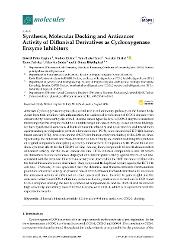| dc.contributor.author | Coşkun, Göknil Pelin | |
| dc.contributor.author | Djikic, Teodora | |
| dc.contributor.author | Hayal, Taha Bartu | |
| dc.contributor.author | Turkel, Nezaket | |
| dc.contributor.author | Yelekçi, Kemal | |
| dc.contributor.author | Sahin, Fikrettin | |
| dc.contributor.author | Küçükgüzel, Şükriye Güniz | |
| dc.date.accessioned | 2019-06-27T08:04:34Z | |
| dc.date.available | 2019-06-27T08:04:34Z | |
| dc.date.issued | 2018 | |
| dc.identifier.issn | 1420-3049 | en_US |
| dc.identifier.uri | https://hdl.handle.net/20.500.12469/959 | |
| dc.identifier.uri | https://doi.org/10.3390/molecules23081969 | |
| dc.description.abstract | Cyclooxygenase enzymes play a vital role in inflammatory pathways in the human body. Apart from their relation with inflammation the additional involvement of COX-2 enzyme with cancer activity was recently discovered. In some cancer types the level of COX-2 enzyme is increased indicating that this enzyme could be a suitable target for cancer therapy. Based on these findings we have synthesized some new diflunisal thiosemicarbazides and 124-triazoles and tested them against androgen-independent prostate adenocarcinoma (PC-3) colon carcinoma (HCT-116) human breast cancer (T47D) breast carcinoma (MCF7) and human embryonic kidney (HEK-293) cell lines. Specifically the diflunisal and thiosemicarbazide functionality are combined during the synthesis of original compounds anticipating a potency enhancement. Compounds 6 10 15 and 16 did not show cytotoxic effects for the HEK293 cell line. Among them compounds 15 and 16 demonstrated anticancer activity for the breast cancer cell line T47D whereas compounds 6 and 10 which are thiosemicarbazide derivatives displayed anti-tumourigenic activity against the PC-3 cell line consistent with the literature. However no activity was observed for the HCT-116 cancer cell line with the tested thiosemicarbazide derivatives. Only compound 16 displayed activity against the HCT-116 cell line. Therefore it was speculated that the diflunisal and thiosemicarbazide functionalities potentiate anticancer activity on prostate cancer and the thiosemicarbazide functionality decreases the anticancer activity of diflunisal on colon cancer cell lines. In order to gain insight into the anticancer activity and COX-2 inhibition molecular docking studies were carried out for COX-1 and COX-2 enzymes utilizing the newly synthesized compounds 15 and 16. Both 15 and 16 showed high selectivity and affinity toward COX-2 isozyme over COX-1 which is in agreement with the experimental results. | en_US] |
| dc.language.iso | eng | en_US |
| dc.publisher | MDPI | en_US |
| dc.rights | info:eu-repo/semantics/openAccess | en_US |
| dc.subject | Diflunisal | en_US |
| dc.subject | Thiosemicarbazide | en_US |
| dc.subject | 124-triazole-3-thione | en_US |
| dc.subject | Anticancer | en_US |
| dc.subject | COX-2 | en_US |
| dc.subject | Docking | en_US |
| dc.title | Synthesis Molecular Docking and Anticancer Activity of Diflunisal Derivatives as Cyclooxygenase Enzyme Inhibitors | en_US |
| dc.type | article | en_US |
| dc.relation.journal | Molecules | en_US |
| dc.identifier.issue | 8 | |
| dc.identifier.volume | 23 | en_US |
| dc.department | Fakülteler, Mühendislik ve Doğa Bilimleri Fakültesi, Biyoinformatik ve Genetik Bölümü | en_US |
| dc.identifier.wos | WOS:000445295500134 | en_US |
| dc.identifier.doi | 10.3390/molecules23081969 | en_US |
| dc.identifier.scopus | 2-s2.0-85052406559 | en_US |
| dc.institutionauthor | Yelekçi, Kemal | en_US |
| dc.relation.publicationcategory | Makale - Uluslararası Hakemli Dergi - Kurum Öğretim Elemanı | en_US |
| dc.identifier.pmid | 30082676 | en_US |
















